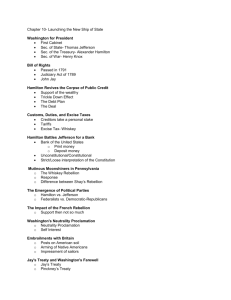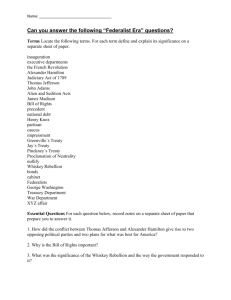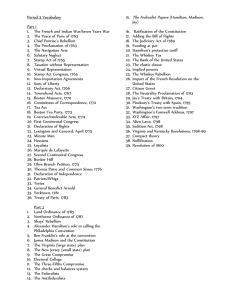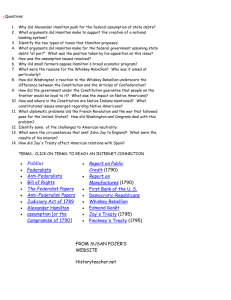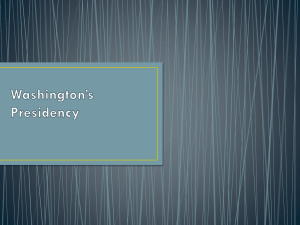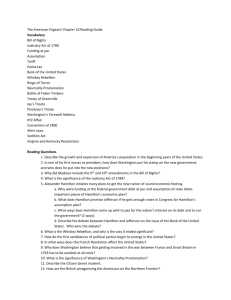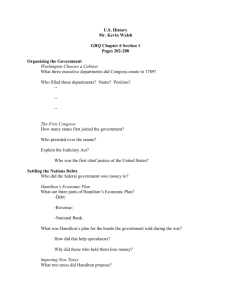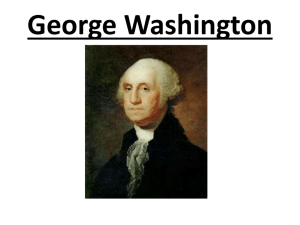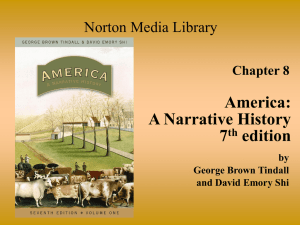Washington Presidency - Introducing Adam Morton
advertisement
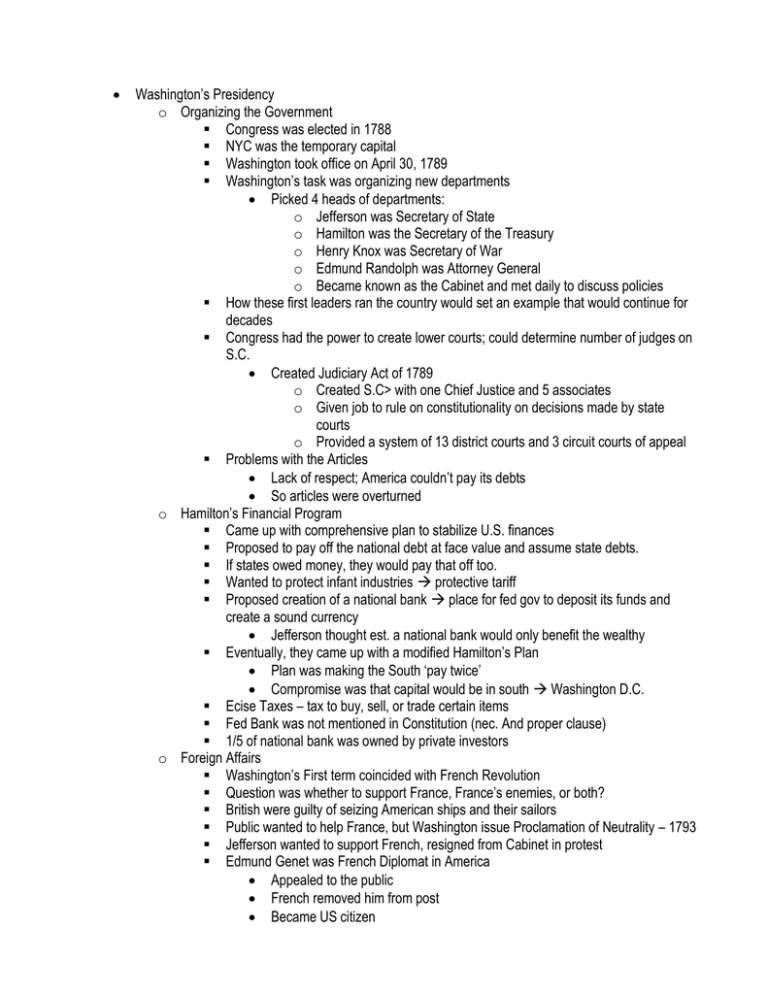
Washington’s Presidency o Organizing the Government Congress was elected in 1788 NYC was the temporary capital Washington took office on April 30, 1789 Washington’s task was organizing new departments Picked 4 heads of departments: o Jefferson was Secretary of State o Hamilton was the Secretary of the Treasury o Henry Knox was Secretary of War o Edmund Randolph was Attorney General o Became known as the Cabinet and met daily to discuss policies How these first leaders ran the country would set an example that would continue for decades Congress had the power to create lower courts; could determine number of judges on S.C. Created Judiciary Act of 1789 o Created S.C> with one Chief Justice and 5 associates o Given job to rule on constitutionality on decisions made by state courts o Provided a system of 13 district courts and 3 circuit courts of appeal Problems with the Articles Lack of respect; America couldn’t pay its debts So articles were overturned o Hamilton’s Financial Program Came up with comprehensive plan to stabilize U.S. finances Proposed to pay off the national debt at face value and assume state debts. If states owed money, they would pay that off too. Wanted to protect infant industries protective tariff Proposed creation of a national bank place for fed gov to deposit its funds and create a sound currency Jefferson thought est. a national bank would only benefit the wealthy Eventually, they came up with a modified Hamilton’s Plan Plan was making the South ‘pay twice’ Compromise was that capital would be in south Washington D.C. Ecise Taxes – tax to buy, sell, or trade certain items Fed Bank was not mentioned in Constitution (nec. And proper clause) 1/5 of national bank was owned by private investors o Foreign Affairs Washington’s First term coincided with French Revolution Question was whether to support France, France’s enemies, or both? British were guilty of seizing American ships and their sailors Public wanted to help France, but Washington issue Proclamation of Neutrality – 1793 Jefferson wanted to support French, resigned from Cabinet in protest Edmund Genet was French Diplomat in America Appealed to the public French removed him from post Became US citizen Chief Justice John Jay Mission in Britain Discuss practice of seizing searching US ships, wanted treaty Brits forced Americans into British Army British “impressed” US sailors I year in Britain resulted in a treaty that addressed western expansion, but did not address impressments 1794 – Jay Treaty, ratified narrowly Spanish Interpreted Jay treaty as sign that we were getting closer to Britain; Spain wanted to consolidate lands Thomas Pinkney – Right of Deposit o US could pass through Louisiana o Settled border of FL 1795 through Pinkney’s Treaty o o Domestic concerns (QUIZ MATERIAL) Settlers moved west of Alleghenies, encroached on natives British were supplying natives with guns Mad Anthony Wayne Battle of Fallen Timbers Ohio territory was now open for settlement – 1795 Was the new government strong enough to stand up against a rebellion? 1794 – Whiskey Rebellion o Hamilton’s ecise tax on whiskey caused some problems o Pennsylvanian farmers grew corn and the easiest method was to go ahead and convert it to whiskey and transfer it over the mountains. o They didn’t want to pay the high taxes for whiskey and rebelled o Hamilton convinced Washington to raise army to put down rebellion of western Pennsylvanian farmers o This proved that government was strong enough to handle internal rebellion 1709s – all 13 states had surrendered their western land claims and the gov passed the Public Land Act of 1796 Sold western land very cheaply in order to increase western population There was also a process of adding new states with the western land 1791 – Vermont, 1792 – KY, 1796 – TN Political Parties o Washington had been unanimously elected This encouraged idea that political parties were not necessary Framers did not create guidelines for political parties Anti-Federalists and Federalists led to the development of parties Washington is unofficially known as a Federalist Two Key leaders formed parties Hamilton – Federalist o Strong in the NE o Favored growth of federal power Jefferson – Democratic Republicans (Anti-Federalists) o Southern/western o Favored states’ rights o Farewell Address Was written out and published Warned America of several things: Don’t get involved in European affairs/ no foreign entanglements Don’t make permanent alliances in foreign affairs Not to form political parties To avoid sectionalism By 1796, both parties had been developed; also, Washington announced he decision not to pursue a 3rd term o “Unwritten Constitution” Traditions that started with Washington’s era and are continued today, not included in Constitution
